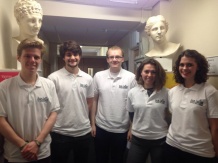articles

The Classics and Ancient History Department's Isca Latina volunteers
Exeter’s Classics and Ancient History Department takes Isca Latina from strength to strength
The Isca Latina workshops were created to offer students the chance to learn Latin in a state school setting. Queen Elizabeth’s Academy in Crediton was asked to form part of the pilot the scheme, with the support of the Classics and Ancient History Department at the University of Exeter, the Classical Association, and the students; Staff Student Liaison Committee.
Since the launch of the lunchtime sessions last year, the turnout has grown, resulting in the academic year of 2014/15 a twenty week programme leading towards an elementary certificate in Latin.
Tom McConnell, Classics finalist and SSLC representative, is currently involved in the planning and delivery of the workshops, alongside his fellow students who wished to gain teaching experience. Tom was first informed of the scheme following encouragement from Isca Latina’s creator, Professor Lynette Mitchell, Professor in Greek History and Politics.
Tom said: “I got involved with Isca Latina when Lynette first advertised it to students, as I thought it'd be an excellent way to develop my teaching skills, as well as giving back to the community.”
As one of a team of volunteers delivering workshops at Queen Elizabeth’s Academy Trust in Crediton, alongside St Sidwell’s and St Leonard’s Primary Schools in Exeter, Tom and his fellow Classics and Ancient History students meet weekly to discuss the content for the forthcoming session. Working from a core text and exercise book, the classes are designed and delivered by the students, giving them the opportunity to elaborate on the content and inspire Ancient Languages and History to leap off the page.
Tom said of the sessions: “It's been particularly enjoyable to build relationships with the students, and see their skills improve. Giving the students but a taste of the ancient world through Latin is the point of this, and it's great to see how they engage with the wonderful language. I've learnt a lot about the experience, including how to structure a lesson, the importance of finding a balance between treating the students as a class and as individuals, and how to deliver with confidence.”
The ambition of the pilot was to offer Classical Languages and Ancient History to local state-run schools. From the outset, many Queen Elizabeth’s faculty members were supportive of the programme.
Rupert Poole, Principal of Queen Elizabeth’s Academy in Crediton said of the programme: “Isca Latina has been a huge boost to students at QE. In the early days it was mostly the older students in the 6th form who benefited from the expert inputs from Exeter University students. This they found both entertaining and very useful as they prepared for their own university applications.”
Mr Poole said: “This academic year we took a new approach and wanted to encourage the younger students from Year 9 (13 -14 year olds) to start to learn the language from an earlier age. This has been hugely successful and a determined bunch of youngsters attend every lunch time during what is a very busy school day and manage to eat and learn Latin at the same time! The students are certainly enjoying the experience.”
Since the inception of the Isca Latina workshops, the partnership between the University and Queen Elizabeth’s Academy have seen recent developments, with the University of Exeter’s Student Guild now incorporating Isca Latina as part of the Exeter Voluntary Scheme. Additionally, new important and exciting links between the school and the University have been forged, with Queen Elizabeth’s students soon having the opportunity to study for a University approved Latin certificate, recognising their efforts formally. The scheme has also benefitted the Exeter students who volunteer their time, inspiring two students to pursue PGCE qualifications. The success and continual development of the programme has prompted more Classics students to come forward and get involved with creating and running these interactive sessions.
On this continual partnership with the University of Exeter’s Classics and Ancient History Department, Mr Poole added: “QE is very grateful for the time and effort that has been put in by Exeter University to get the lessons running smoothly. We are looking forward to the students completing the course and gaining the University accredited certificate, which will be fantastic. My thanks to all the teachers and in particular to Lynette Mitchell who has been the driving force behind the project, and to Anne Moody who has driven the project for QE.”
For more information about the Classics and Ancient History department, please visit the College of Humanities pages.
Date: 16 February 2015
